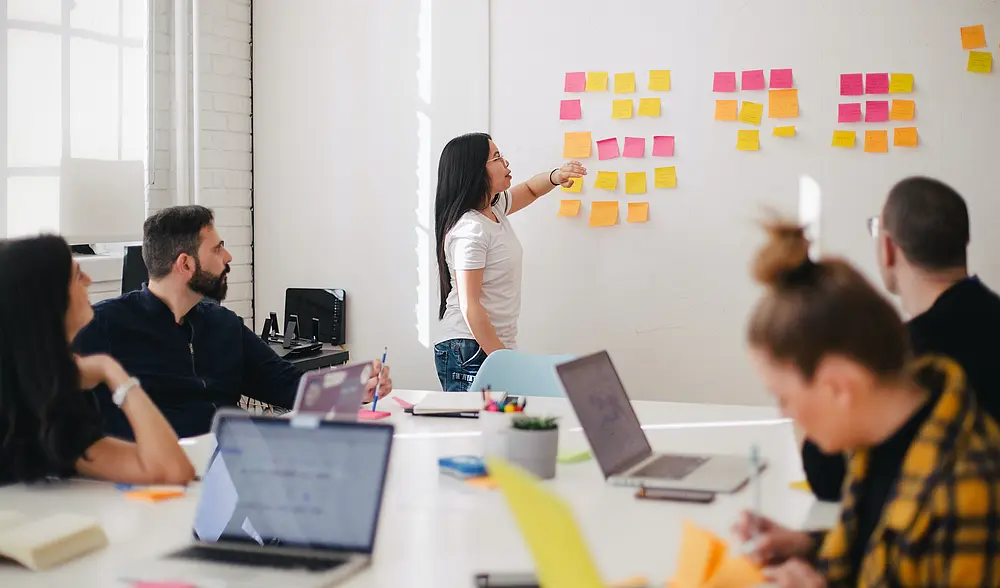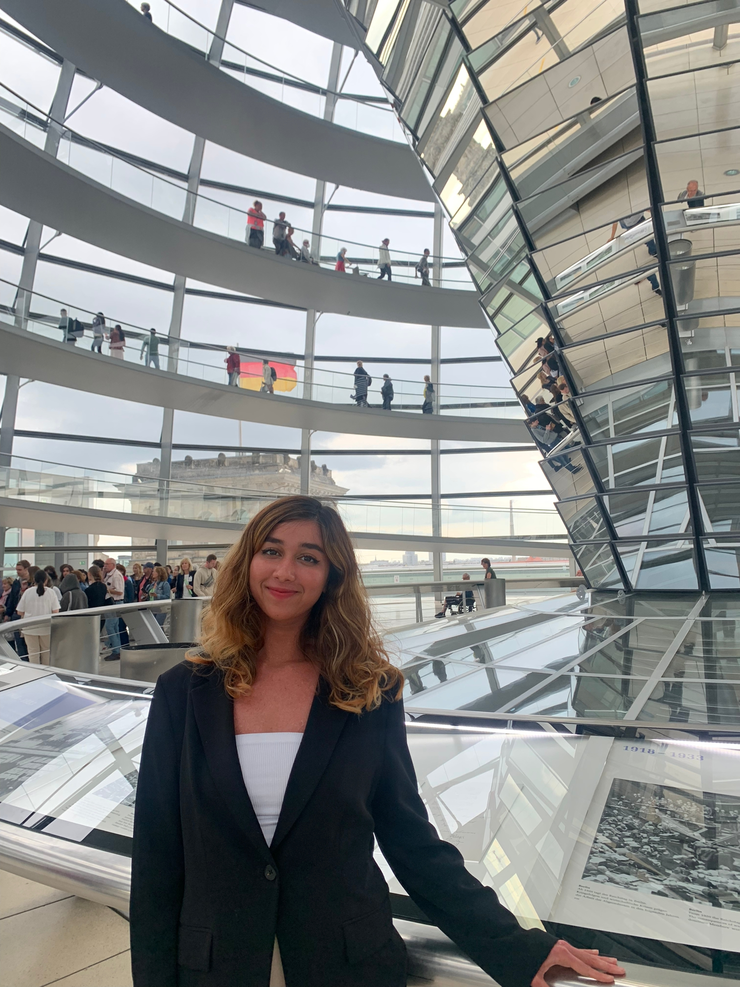Project Groups in Academic Year 2023

The Brandt School provides space for the students to get a chance to apply their theoretical learnings on a project provided by an external organization. Last week we heard from our alumni Ani Tovmasyan on one of last year’s project, “Armed State Actors and Transitional Justice”. This year also provides a list of several interesting projects with several organizations. Here is an overview of what second year MPP students are doing this year:
Transformative Leadership
The BMW Foundation project, which started in 2022, brings together diverse stakeholders such as leadership organizations and system thinkers to collaborate in the aim to identify synergies, underutilized resources, and foster cooperation on the theme of transformative leadership. The current focus is on relational infrastructure, which is a framework that includes social connections, interactions, and collective intelligence to improve collaboration, problem-solving, and change activities.
The BMW Foundation has finished the project's first phase, Map & Observe, which included intensive research into the landscape of actors involved in transformative leadership. As a result, the project moved on to the second phase, which culminated in a three-week gathering. The Willy Brandt School and Sense Lab are important external supporters of the BMW Foundation in this transformative effort. The Willy Brandt School began contributing to this project in the second stage, which is the enabling process.
As an external supporter, the Willy Brandt School group, steered by Prof. Dr. Heike Grimm, will collaborate with the BMW Foundation and important leadership stakeholders. Their focus is on developing an architecture for transformative leadership that facilitates an emergent process while meeting the demand to provide meaningful results. Additionally, Identifying and combining viewpoints and voices that are currently missing from the global transformative leadership landscape.
Improving Local Representation: Lessons from the Global South
Democratic representation, a cornerstone of equality and justice, thrives when elected officials mirror the diversity of their constituents. Yet, many historically marginalized groups still grapple with exclusion from representative bodies across all government levels. However, the Global South has been emerging with innovative strategies. South Africa's groundbreaking fifty percent gender quota for local councils and India's Panchayati Raj system showcase effective policies securing the presence of marginalized groups. Notably, Latin America pioneers gender quotas, ensuring parity in Mexico, Bolivia, Costa Rica, and Nicaragua.
Electoral quotas prove instrumental, with significant strides in India, Malaysia, Nigeria, and South Africa. Local councils with reserved seats for castes, tribes, and ethnic minorities amplify their voices in decision-making. Indigenous peoples globally advocate for self-determination, influencing both formal and informal arrangements in local governance.
This project guided by Prof. Dr. Mariana Llanos, is working with the Thüringer Staatskanzlei Antidiskriminierungsstelle (LADS) to systematically analyze global policies on local political representation for marginalized groups, shedding light on their pros, cons, and success rates. Focusing on the less-explored local level, the initiative delves into various organizational structures, decentralization strategies, and formal or informal representation mechanisms. The outcome anticipates a comprehensive presentation and a succinct report, offering recommendations for a more inclusive democratic landscape.
Coop_IT - Digital Safe Space Repository for Activists in Illiberal Regimes for Kiron Open Higher Education
In the face of the recent trend of shrinking civic spaces in illiberal regimes, precautionary protection against digital threats is a necessary basic requirement, but there appears to be a gap in the tools available. Particularly, it appears that there is by no means sufficient support from the perspective of the target group e.g., journalists, human rights defenders and activists generally. They are therefore exposed to threats.
Coop_IT, a one-year project (August 2023 until July 2024) funded by the German Foreign Ministry, comes into this context. The project facilitated by Prof. Dr. Achim Kemmerling, aims at building a collaborative community for activists, journalists, cultural workers, refugees, students, etc. in illiberal contexts. Taking the first step towards the collaborative community, this project group is to conducts a feasibility study on whether it is possible and appropriate to build a platform on which activists share digital tools that are then checked by a team of experts and if rated as good to recommended.
At the forefront of this project, Brandt School students take part in a desk review, prepare interview guides, conduct interviews with 40 stakeholders from illiberal countries and analyze the findings of the interviews, which will be then shared with Kiron the primary client and through it, with the German Foreign Ministry.
Everyday Practical Peacebuilding
The 'Everyday Practical Peacebuilding' initiative, supported by the local NGO Culture Goes Europe (CGE), is set to undertake a project funded by the European Solidarity Corps grant. The main goal is to link Brandt School students with the local community, applying their knowledge to make a positive impact on the social context in Erfurt and Thuringia. This practical experience guided by Dr. Alejandra Ortiz-Ayala, enables students to solidify their careers in peacebuilding, working towards preventing both direct and indirect violence globally through real project management.
Brandt School students participating in this initiative will apply the knowledge gained from the Conflict Studies and Management specialization courses. The project aims to provide students with a hands-on understanding of the project management process in the context of peacebuilding.
The objectives focus on developing students' knowledge and skills in various areas, including project management, budget planning, evidence-based activity planning for peacebuilding, designing impact measurement tools, report writing, logistics and bureaucratic processes, teamwork, nonviolent communication within groups, and managing unexpected workloads and conflicts. The ultimate goal is to equip students with practical skills that go beyond the classroom, preparing them for impactful careers in peacebuilding.
Digital Transformation in Vocational Education: Emerging Trends and Prospects for the German State of Thuringia
Thuringia places significant importance on vocational training as a crucial element for business success and the generation of new employment opportunities. Therefore, it is essential that the sector transforms to factor in digitalization. The project group facilitated by Dr. Hasnain Bokhari, explores the influence of digitalization on vocational training in Thuringian institutions, assessing the current state of digitization in vocational education, and examining the roles of acceptance and the variety of educational programmmes in the context of digitalization.
In addition to presenting the current status of digitization in vocational education in Thuringia, the policy recommendation paper shall provide insights into anticipated and future trends. The policy paper shall encompass digitalization themes such as AI(Artificial Intelligence), hybrid learning, online conferencing systems, learning with avatars in virtual environments and cloud systems.
Another element of the project is to compare the digitalization of the vocation education sector of Thuringia to other German states. Through this process, learnings can be gathered from equivalent states where new and innovative solutions are currently implemented. Ultimately, the students will summarize their learnings and provide policy recommendations appropriate to the state of Thuringia to their client, Digital Agentur.
Designing a future multi-donor fund for de-risking and greening investments in Ukraine under the Energy Community
The Energy Community is an international organization which brings together the European Union and its neighbors to create an integrated pan-European energy market. This project group, under the guidance of Prof. Dr. Andreas Goldthau, is dedicated to exploring strategic avenues and proposing recommendations to the Energy Community for the establishment of a future multi-donor fund. This fund specifically targets the challenges faced by Ukraine in securing adequate financing for its post-conflict reconstruction efforts. Focusing on infrastructure, energy systems, and industrial capacity, the primary goal is to attract substantial private investment, considering the inadequacy of public funds. The project seeks to address prevalent obstacles in the Ukrainian market, such as corruption, institutional hurdles, and uncertainties, which deter private sector involvement.
This involves conducting an in-depth analysis of existing approaches to multi-donor funds, drawing insights from contexts involving (post) conflict or natural disaster environments. Emphasis will be placed on devising mechanisms capable of functioning in the current or future states of conflict and ensuring resilience and adaptability. The project extends its focus to energy systems, potentially encompassing transformative infrastructure projects and their decarbonization. The outcome will be a comprehensive policy report outlining the contours of the envisaged multi-donor fund and its operational framework for the sustainable reconstruction and greening of Ukraine's economy.
About the Author

Neha Singh, a Masters in Public Policy candidate at the Willy Brandt School, possesses a diverse background in knowledge and community management, spanning areas such as environment, digitalization, marketing, and partnership development. Her expertise has been honed through roles in education technology startups, community building initiatives, international cooperation with GIZ Thailand, and various positions within both local and national committees of AIESEC Thailand. She is dedicated to making a difference on environmental topics, conflicts and human rights.
~ The views represented in this blog post do not necessarily represent those of the Brandt School ~